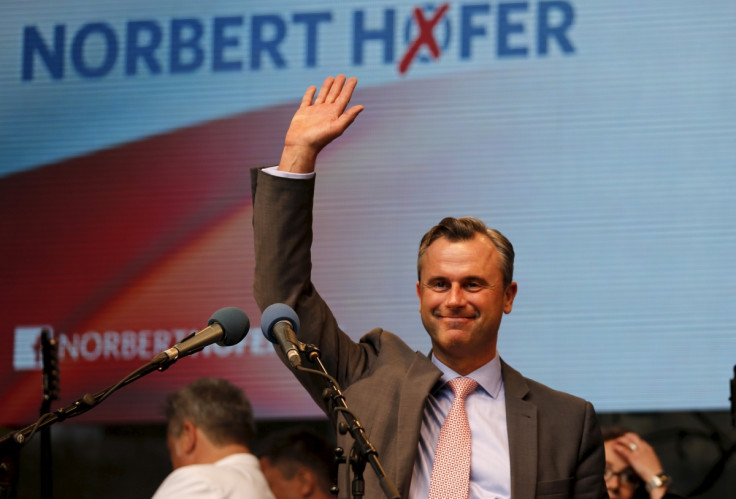Austria's right-wing Freedom Party win first round of presidential vote

Norbert Hofer, of Austria's anti-immigrant Freedom Party, has garnered over 35% of votes in the country's presidential election, putting him far ahead of the other five candidates. The victory suggests dissatisfaction among the electorate with the centre-left Social Democrats. But none of the candidates have secured the required 50% of the vote to win.
Hofer, who ran on an anti-immigration and anti-Europe policy, faces a challenge against Green Party veteran Alexander van der Brellen and Irmgard Griss, a former Supreme Court judge. The two candidates both took nearly 20% of the vote, and could stand against Hofer in the next round on 22 May, according to AP.
Brellen, 72, has criticised the government for being too harsh in its treatment of asylum applicants, unlike Hofer, who claims that the government has been too lenient.
#BREAKING: 1 in 3 #Austria'ns voted the far right freedom party in todays presidential elections pic.twitter.com/e50WqAKGsK
— Amichai Stein (@AmichaiStein1) April 24, 2016
The Freedom Party's strongest previous showing was more than 27% in earlier elections deciding Austria's membership in the EU.
The far-right party will benefit most from the combination of anger and anti-EU sentiment, believes Wolfgang Boehm, political editor at Die Presse. "Due to the recent crisis, I assume that the anti-EU Freedom Party (FPOe) is going to be the major beneficiary of euroscepticism," he said.
The party is using two politicians in its campaign – Harald Vilimsk, a professional PR consultant and close colleague of Freedom Party leader, Strache. The other is a publicist and far-right politician Andreas Moelzer, currently an MEP.
Accusations of Naziism
The cover story of the February issue of Zur Zeit, his magazine, The Gypsies Are Coming, caused outrage in Austria. The editorial was critical of lifting labour restrictions on Bulgarian and Romanian workers and also compared left-wing protesters to National Socialists (Nazis).
A cartoon in the magazine also depicted the night of 24 January as "Kristallnacht 2014", because thousands of left-wingers and anti-fascists protested against the Academics Ball, an annual gathering organised by the Freedom Party. During the actual Kristallnacht, on 9 November 1938, Nazis in Germany attacked synagogues, Jewish homes, schools and businesses and nearly 100 Jews.
The Austrian president has a primarily ceremonial role. However, as head of state, the president is commander-in-chief of Austria's military, swears in the chancellor – Austria's political leader – and has the power to dismiss the cabinet.
© Copyright IBTimes 2024. All rights reserved.






